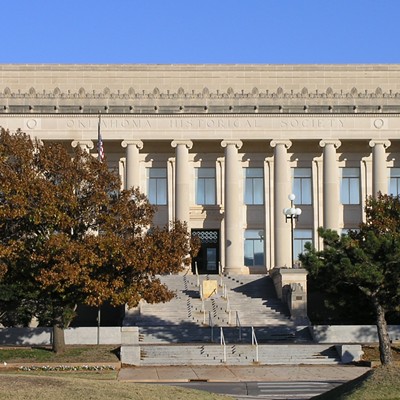Oklahoma Historical Society shares black history online
[{
"name": "Air - Ad - Leaderboard - Inline",
"insertPoint": "1/2",
"component": "10513996",
"requiredCountToDisplay": "6",
"parentWrapperClass": ""
}]
The Oklahoma Historical Society (OHS) has released a new landing page on its website that offers numerous opportunities to learn more about the Black experience in Oklahoma. Visit www.okhistory.org/blackhistory to start exploring.
“Drawing attention to the legacy of racism is not enough to make permanent change,” said Dr. Bob Blackburn, executive director of the OHS. “If we are to find a path forward, all of us must understand the complex story of the Black community in Oklahoma. This landing page on our website opens windows to encourage that conversation using collections we have developed over the past 40 years.”
Visitors to the website can explore historic Black newspapers, watch film footage, search online collections and listen to podcasts. Included are biographies of civil rights leaders Clara Luper, Ada Lois Sipuel Fisher, Melvin Porter and Roscoe Dunjee; authors Ralph Ellison, Clifton Taulbert, Joyce Carol Thomas and John Hope Franklin; and so many others who shaped Oklahoma’s history and culture. Lesson plans, e-exhibits designed for students and guides correlating to Oklahoma history academic standards provide educational support for teachers and parents. Historic topics highlighted include the Tulsa Race Massacre, the Civil Rights Movement, early Oklahoma, and All-Black towns. These resources and more are available at www.okhistory.org/blackhistory.
Black history in Oklahoma is complex and unique. In the early 19th century members of the Cherokee, Muscogee (Creek), Choctaw and Chickasaw tribes brought enslaved people with them on their forced removal to present-day Oklahoma. After the Civil War, these freedmen received tribal allotments. Other formerly enslaved people saw Oklahoma as a possible “paradise,” and some hoped for an All-Black territory or state. After statehood, the first bill proposed by the Oklahoma Legislature was Senate Bill One, which initiated Oklahoma’s Jim Crow era and subjected Oklahomans to racial segregation and the Black community to oppression. In the mid-20th century, Oklahoma was a leader in the Civil Rights Movement. Clara Luper led the charge to integrate Oklahoma City’s eating establishments through peaceful sit-ins two years before the famous protests in Greensboro, North Carolina.
The mission of the Oklahoma Historical Society is to collect, preserve and share the history and culture of the state of Oklahoma and its people. Founded in 1893 by members of the Territorial Press Association, the OHS maintains museums, historic sites and affiliates across the state. Through its research archives, exhibits, educational programs and publications the OHS chronicles the rich history of Oklahoma. For more information about the OHS, please visit www.okhistory.org.
“Drawing attention to the legacy of racism is not enough to make permanent change,” said Dr. Bob Blackburn, executive director of the OHS. “If we are to find a path forward, all of us must understand the complex story of the Black community in Oklahoma. This landing page on our website opens windows to encourage that conversation using collections we have developed over the past 40 years.”
Visitors to the website can explore historic Black newspapers, watch film footage, search online collections and listen to podcasts. Included are biographies of civil rights leaders Clara Luper, Ada Lois Sipuel Fisher, Melvin Porter and Roscoe Dunjee; authors Ralph Ellison, Clifton Taulbert, Joyce Carol Thomas and John Hope Franklin; and so many others who shaped Oklahoma’s history and culture. Lesson plans, e-exhibits designed for students and guides correlating to Oklahoma history academic standards provide educational support for teachers and parents. Historic topics highlighted include the Tulsa Race Massacre, the Civil Rights Movement, early Oklahoma, and All-Black towns. These resources and more are available at www.okhistory.org/blackhistory.
Black history in Oklahoma is complex and unique. In the early 19th century members of the Cherokee, Muscogee (Creek), Choctaw and Chickasaw tribes brought enslaved people with them on their forced removal to present-day Oklahoma. After the Civil War, these freedmen received tribal allotments. Other formerly enslaved people saw Oklahoma as a possible “paradise,” and some hoped for an All-Black territory or state. After statehood, the first bill proposed by the Oklahoma Legislature was Senate Bill One, which initiated Oklahoma’s Jim Crow era and subjected Oklahomans to racial segregation and the Black community to oppression. In the mid-20th century, Oklahoma was a leader in the Civil Rights Movement. Clara Luper led the charge to integrate Oklahoma City’s eating establishments through peaceful sit-ins two years before the famous protests in Greensboro, North Carolina.
The mission of the Oklahoma Historical Society is to collect, preserve and share the history and culture of the state of Oklahoma and its people. Founded in 1893 by members of the Territorial Press Association, the OHS maintains museums, historic sites and affiliates across the state. Through its research archives, exhibits, educational programs and publications the OHS chronicles the rich history of Oklahoma. For more information about the OHS, please visit www.okhistory.org.












